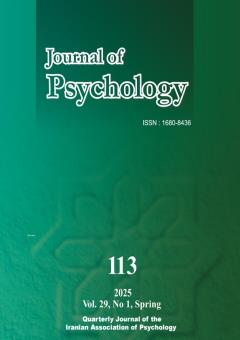Investigating the impact of emotional divorce and domestic violence on the tendency to extramarital relationships with the mediating role of psychological distress in married women.
Subject Areas : روانشناسی خانوادهAzam Mohamadpur-Eyradmosa 1 , maryam aghelmasjedi 2 *
1 -
2 - Department of Health Psychology, Ra.C., Islamic Azad University, Rasht, Iran.
Keywords: Emotional divorce, domestic violence, extramarital relationships, psychological distress,
Abstract :
The purpose of this research was to determine the impact of emotional divorce and domestic violence on returning to extramarital relationships with the role of psychological distress as a mediator. The present study was applied in terms of its purpose and descriptive in terms of the nature and method of implementation. The statistical population includes all married women who refer to counseling clinics in Tehran (470 people), and the statistical sample of the present study is 200 married women who were selected by sampling method. Multi-stage clustering was determined based on the structural equation modeling methodology of the sample size. Data collection tools include John Guttman's Emotional Divorce Questionnaire (2000), Mark Watley's Infidelity Attitude Questionnaire (2006), and Simmons and Gaher's Psychological Distress Questionnaire (2005). ), the questionnaire for measuring violence against women was Haj Yahya (2001) and in order to analyze the data, inferential statistics methods (structural equation modeling, exploratory factor analysis, Student's t-test) were used appropriately. A significance level of 0.05 was considered. SPSS-20 and AMOS-24 software were used for analysis. The research findings showed that domestic violence has a direct positive effect on psychological distress (T = 3.510, β = 0.221). Also, the research findings showed that emotional divorce, psychological distress, domestic violence and emotional divorce have a direct positive effect. It has a direct positive effect on psychological distress and has a direct positive effect on extramarital relations.
اربابی، فائزه؛ سراوانی، شهرزاد؛ زینلیپور، مژگان و هاشمی سنجابی، امیر. (1401). اثربخشی ذهنآگاهی مبتنی بر شناختدرمانی بر بهزیستی روانشناختی، کیفیت زندگی و تابآوری در زوجین با تعارضات زناشویی. مجله روانشناسی، 26(2)، 149-140.
ارجمند سیاهپوش، اسحق و عجمدشتی، فریال. (1390)، بررسی عوامل اجتماعی- اقتصادي مؤثر بر خشونت علیه زنان در شهر اهواز، مجله تخصصی جامعهشناسی، 1(3)، 118-91
اسمیت، ادوارد ای؛ ج بم، داریل ؛ اتکینسون، ریتا ال؛ اتکینسون، ریچارد سی و نولن هوکسما، سوزان. (2004). زمینه روانشناسی هیلگارد. ترجمه: براهنی، محمدنقی و همکاران. تهران: رشد
طیفیان، مریم؛ عرشی، ملیحه؛ علیپور، فردین؛ قائد، امینی و هارونی، غلامرضا. (1395) بررسی رابطه خشونت خانگی وطلاق عاطفی در میان زنان متأهل شهر تهران در سال۱۳۹۵. فصلنامه مددکاری اجتماعی، ۵ (۲) :۱۲-۵
کاوه فارسانی، ذبیح الله، نظری فر، محسن، محمودی نجف آبادی، فاطمه. (1402). ارزیابی الگوی رابطه بین ذهنآگاهی و کیفیت رابطه زناشویی با میانجیگری باورهای لذتبری و قدردانی. مجله روانشناسی، 1(27)، 1-9.
کیایی راد، حسین؛ پاشا، رضا؛ عسگری، پرویز و مکوندی، بهنام. (1401). اثربخشی طرحواره درمانی بر روابط فرازناشویی و خشونت خانگی در زنان درگیر در طلاق عاطفی. دانش و پژوهش در روان شناسی کاربردی، 23(3)، 204-188.
لشگری، مهدی. (1397). بررسی مروری عوامل موثر در بروز روابط فرازناشویی در افراد متأهل. سومین کنفرانس توانمندسازی جامعه در حوزه علوم انسانی و مطالعات روانشناسی،تهران، 145-153.
نصیری جونقانی، مهناز؛ اصغری، فرهاد و علیپور، صفر. (1399). بررسی رابطه ساختاری طرحوارههای ناسازگار اولیه، تمایزیافتگی خود و عملکرد جنسی با تمایل به روابط فرازناشویی. مجله روانشناسی، 3(25)، 329-349.
یزدخواستی، بهجت و شیري، حامد. (1387). ارزشهاي پدرسالاري و خشونت علیه زنان، فصلنامه مطالعات زنان، 6(5)، 70-83.
یکهکار، شیرین و حسینی حاجی بکنده، سید احمد. (1397). ویژگیهای خشونت خانگی علیه زنان و زمینههای فرهنگی مرتبط با آن. پژوهشنامه مددکاری اجتماعی، 5(16)،231-217.
Barzoki، M. H.، Tavakoll، M.، & Burrage، H. (2015). Rational-emotional ‘divorce in Iran. Applied Research in Quality of Life، 10(1) ، 107-122.
Baugh، L. M.، Cox، D. W.، Young، R. A.، & Kealy، D. (2019). Partner trust and childhood emotional maltreatment: The mediating and moderating roles of maladaptive schemas and psychological flexibility. Journal of Contextual Behavioral Science، 12، 66-73.
Bhandari، S. (2018). South Asian women's coping strategies in the face of domestic violence in the United States. Health Care for Women International، 39(2) ، 220-242.
Diop-sidibe N، Campbell J، Becker S. (2016). Domestic violence against women in Egypt. Soc Sci Med. 62(5):1260-77.
Doherty، W. J.، Kalantar، S. M.، & Tarsafi، M. (2020). Divorce ambivalence and reasons for divorce in Iran. Family Process. 1، 1-10.
Evans، P.، McPherson، G. E.، & Davidson، J. W. (2013). The role of psychological needs in ceasing music and music learning activities. Psychology of Music، 41(5) ، 600-619.
Fadaiea tehrani، M.، Khademi، B. (2015). Evaluation of the tendency to psychotropic drugs among the high school students of the city of Bandar Abbas and the influencing factors on them. Journal of renewable natural resources Bhutan، 3(7) ، 23-34.
Fayazi، S.، Rokhafroz، D.، Gheibizadeh، M.، Hakim، A.، & Sayadi، N. (2015). Personal، Familial، and Social Factors Contributing to Addiction Relapse، Ahvaz، Iran. Jentashapir Journal of Health Research، 6(3). 11-15.

